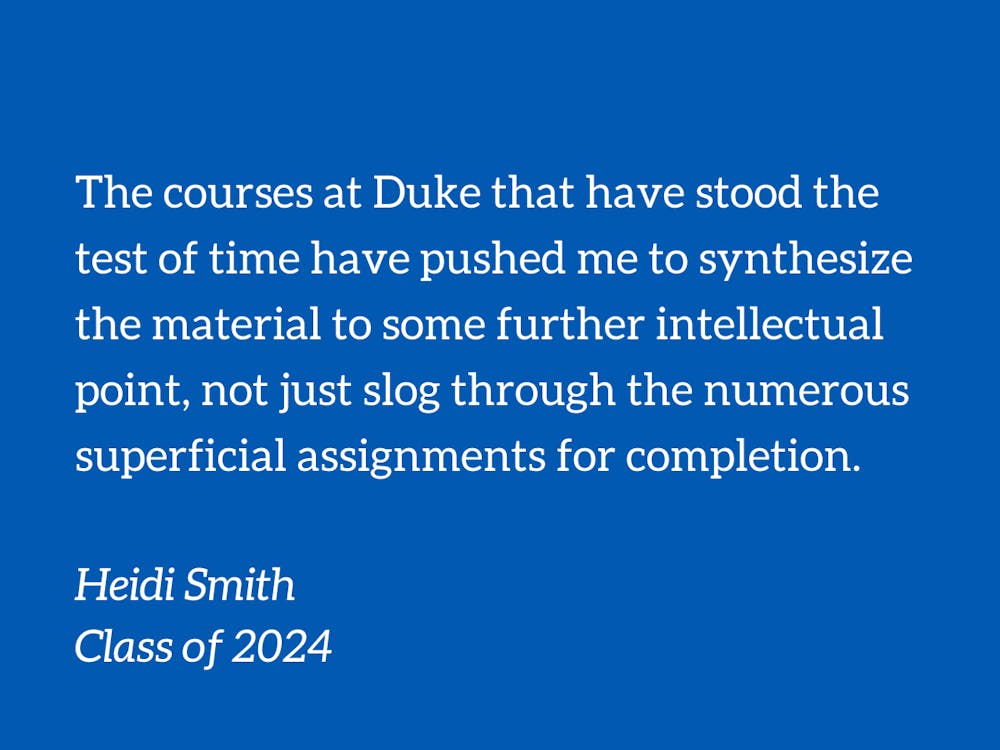Many of our professors have begun to change how they teach, whether that be to better connect with the “TikTok generation” or to evaluate us based on more “holistic criteria.” Thus, we as students have become accustomed to the new, more task-based style of quantity over quality of work, and when asked to perform at a higher—i.e., previously average—level, we are not always able to do so.
I won’t call out any specific classes, but I will define a spectrum of pedagogy that spans roughly from traditional to new wave. The old way is, essentially, using a few substantial deliverables and maybe some class participation to constitute the bulk of your grade. For example, an English class in which you write three 2,000-word papers and discuss a new novel every other week or a Computer Science course with a midterm, final and a programming assignment every couple of weeks.
The new way is, to put it succinctly, everything everywhere all at once. Think, in a humanities class: a weekly Sakai forum post, readings twice a week, a couple of “longer” reading responses, taking turns leading a class discussion and/or a “creative” final project. In a STEM course: readings for every session, a flipped classroom, projects and short assignments and labs with overlapping deadlines, many short quizzes, along with perhaps shorter or take-home tests.
There’s a difference between saying something and having something to say; spending more time doing tasks that ask less of me, intellectually, feels counterintuitive. There is no need to go beyond the minimum level of engagement, so it feels almost silly to put forth the extra effort to master the material rather than just get by. When doing the least will do just fine, why risk doing anything more?
I feel like my intelligence is disrespected when professors don’t deem myself and my peers capable of more than simply regurgitating course material and taking the next step intellectually to perform at a higher level. I’m pretty sure we all learned how to read and summarize in primary school, so I’d be curious to know the benefits of this teaching style. I’ll be frank, I can’t stand these types of courses, and I now do my best to avoid them whenever possible.
From my understanding, professors think we like the new-style teaching method—or else we can’t handle the old—and if it’s the first thing you’re exposed to in college, you just might base your expectations on it. It can also be challenging to perform this intellectual heavy-lifting once you’re used to the new method. As students, we recognize these new-wave classes as not to be taken seriously—just listen to your Pratt friends talking about their Trinity humanities requirements. Unfortunately, this also helps reinforce the idea that certain subjects are less important than others.
I did not have what I would consider an actual paper, programming project or exam until my second semester, as that first fall consisted entirely of new-style classes. Since I didn’t experience Duke before the pandemic, I can’t say for sure how much it changed how our professors teach, but at that moment, it felt great; college was easy. This surprising simplicity was partially due to the nature of virtual college classes during the pandemic—and the fact that activities beyond school were limited. It might be tricky to reintroduce old standards after they were understandably lowered due to the pandemic; however, these courses certainly aren’t gone yet, and once I started needing to take them, I had quite the wake-up call. My expectations were set low, so bringing my effort to meet a reasonably placed bar felt unnecessarily painful.
I’ve realized that personally, I learn when I have time to think. When I have more than a few days for an assignment, I can turn it over in my head instead of being forced to grind it out as quickly as possible. I don’t feel like this when I’m rushing to write a forum post or complete interactive textbook activities an hour before they’re due, nor when I have to teach myself all the necessary concepts before being able to start the pair of assignments that are due two days apart.
Academic coursework is similar to exercise. Just because you look to be doing a lot of work doesn’t mean you will better yourself; you have to push yourself to make progress, but you also have to be intentional about the time you spend on it. Maybe being forced to sink or swim every once in a while isn’t the worst thing—so long as a class is fair in its rigor, it can help you figure out what you most enjoy learning. The courses at Duke that have stood the test of time have pushed me to synthesize the material to some further intellectual point, not just slog through the numerous superficial assignments for completion.
As students, we should demand to be taken seriously and given work that will challenge us, not be tested on the number of balls we can juggle simultaneously. I’ve realized that if I want to learn things here, I must actively seek out the types of classes that will force me to think, synthesize and grow. We shouldn’t villainize professors for trying to push us to work harder, nor should we only give 5 stars on Rate My Professors if a class was easy. On the other side of things, professors should respect the capabilities of us students and teach us in ways that are rigorous but not necessarily so task-driven. Our expectations adjust depending on what is expected of us, but once we get used to the new-wave methods, we may struggle to go back to the old, fulfilling those age-old fears that led to the educational changes in the first place.
Heidi Smith is a Trinity junior. Her column runs on alternating Tuesdays.
Get The Chronicle straight to your inbox
Signup for our weekly newsletter. Cancel at any time.

